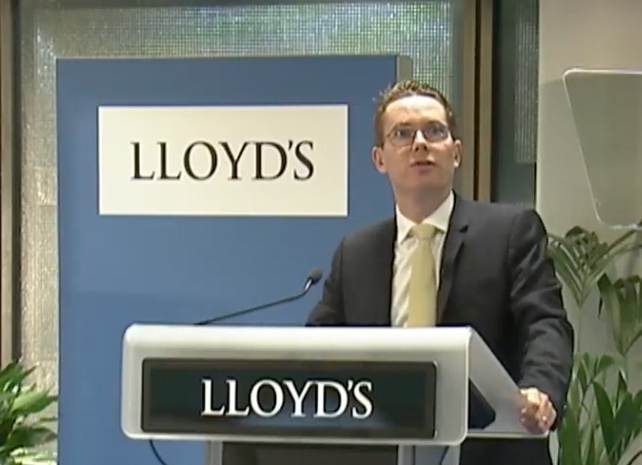Lloyd’s watching reinsurance closely, will support opportunities: Tiernan

This morning, participants in the Lloyd’s insurance and reinsurance market were warned to be cognisant of challenging reinsurance market conditions and the renewals that lie ahead, but were also told that the market will support those able to capitalise on this on the inwards side.
Speaking to the market, Patrick Tiernan, Chief of Markets at Lloyd’s, explained that reinsurance market conditions are being closely watched and urged any participants to alert Lloyd’s to any changes in their reinsurance programs as soon as is practical.
“We wanted to take this opportunity to highlight reinsurance, an area we feel has materially shifted since we were last out here together, and that requires close attention,” Tiernan said.
He explained that Lloyd’s sees reinsurance “from both the cedents and the reinsurance perspective,” with just under a quarter of gross written premiums in the market ceded to third party sources of reinsurance capital.
He continued to say that, “We’re closely watching the availability, structuring, pricing and terms of upcoming reinsurance placements, particularly in property and certain specialty classes.”
Adding that, “We can’t go around with our heads in the sand,” and ignore the changing and more challenging reinsurance market conditions.
He cautioned the Lloyd’s market on the need to be responsive to any challenges that arise, or changes to their reinsurance arrangements.
“It is an inherent expectation that managing agents consider the feasibility of their planned reinsurance strategy, with a reassessment of risk appetites, underwriting strategy and capital, if placements differ to plan.
“So as part of the process this year, all syndicates have been asked to provide their assumptions around their outwards reinsurance rates, limits, retentions and availability of cover, to help evaluate underwriting plans,” Tiernan explained.
Adding, “We do need you to be cognisant of current conditions and ensure that your 2023 business plans have thoughtful assumptions and sensible contingency arrangements.”
He noted that it was already a requirement that syndicates notify Lloyd’s of changes to reinsurance programs, urging the market to be realistic to avoid having to resubmit plans in Q1.
Tiernan then moved on to discuss the opportunities that may present themselves, as reinsurance markets harden and said Lloyd’s will be supportive of those able to grow.
“This may represent an opportunity for those who write inwards treaty reinsurance at Lloyds,” he said.
Adding, “We’ll actively look to support those well-positioned to take advantage of any opportunities you wish to pursue.
“Hopefully this is evident in the flexibility around catastrophe risk appetite capital requirements that we have provided to those syndicates who meet the qualifying criteria.
“This will enable more growth in the LCM five exposures, while still remaining within our overall appetite.”
But, on the other hand, Tiernan warned, “We cannot show the same flexibility, on either capital or growth, where plans are built more on optimism than demonstrable experience.”
Top-performing syndicates are set to get a little more capital flexibility when it comes to growing in catastrophe risks, it seems, while those that haven’t performed so well are unlikely to get any leverage to expand, in terms of cat exposure.
He said Lloyd’s intends to be agile to respond quickly to change requests, seeking to allow the market to maintain capital prudence even if pressures or opportunities arise.
“We will seek to strike the right balance of prudence and practicality when it comes to reinsurance and capital setting,” Tiernan said.
It’s interesting to note that Tiernan did not mention Lloyd’s insurance-linked securities (ILS) initiatives, its recent launch of the London Bridge 2 ILS structure, or how this could actually work in the favour of market participants at this stage of the reinsurance cycle.
Lloyd’s syndicates and members could tap investor appetite for risk, using the London Bridge 2 ILS structure, perhaps accessing reinsurance capital that has a lower general cost associated with it, or in a manner that could lower intermediation costs associated with it.






